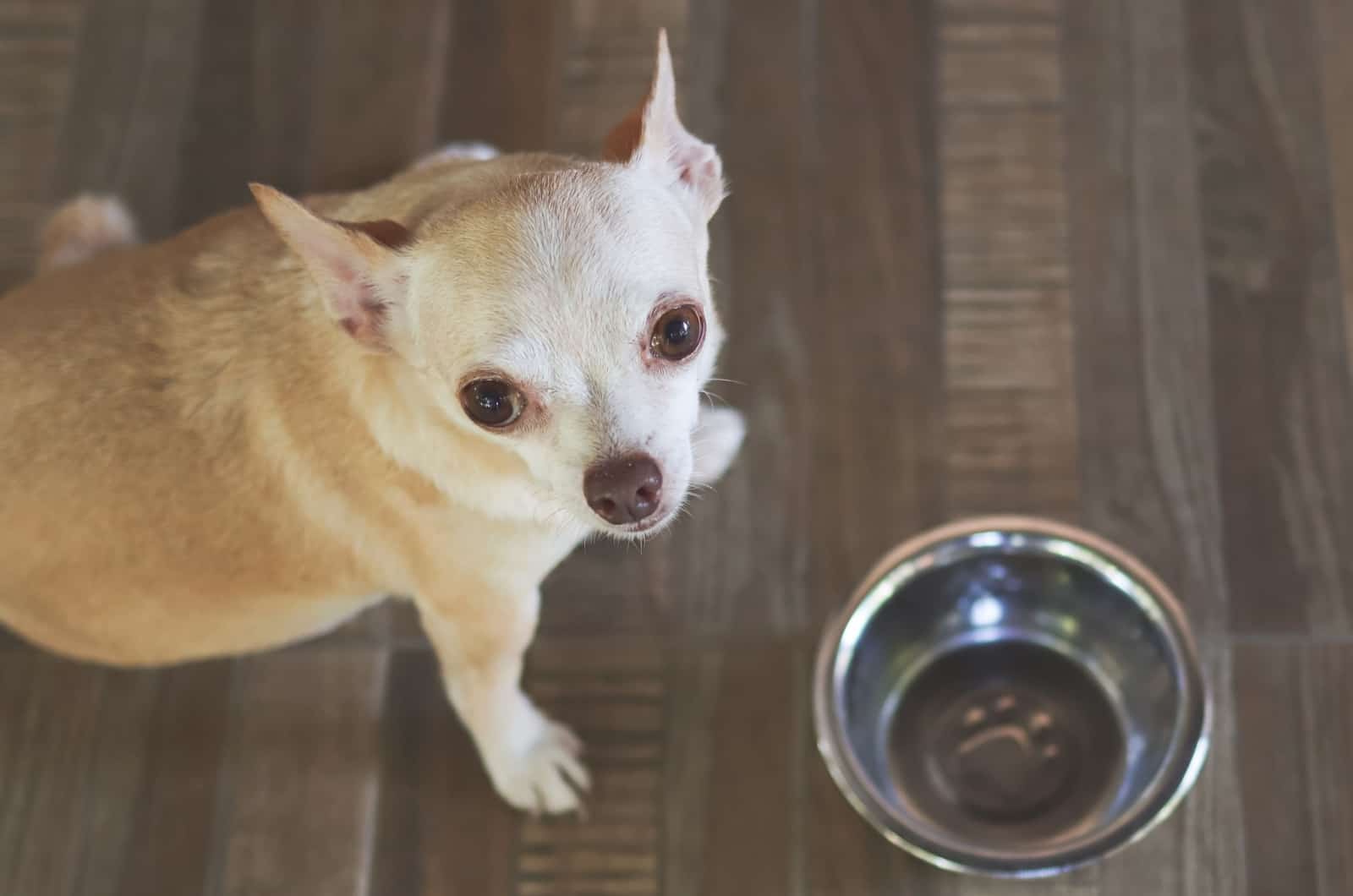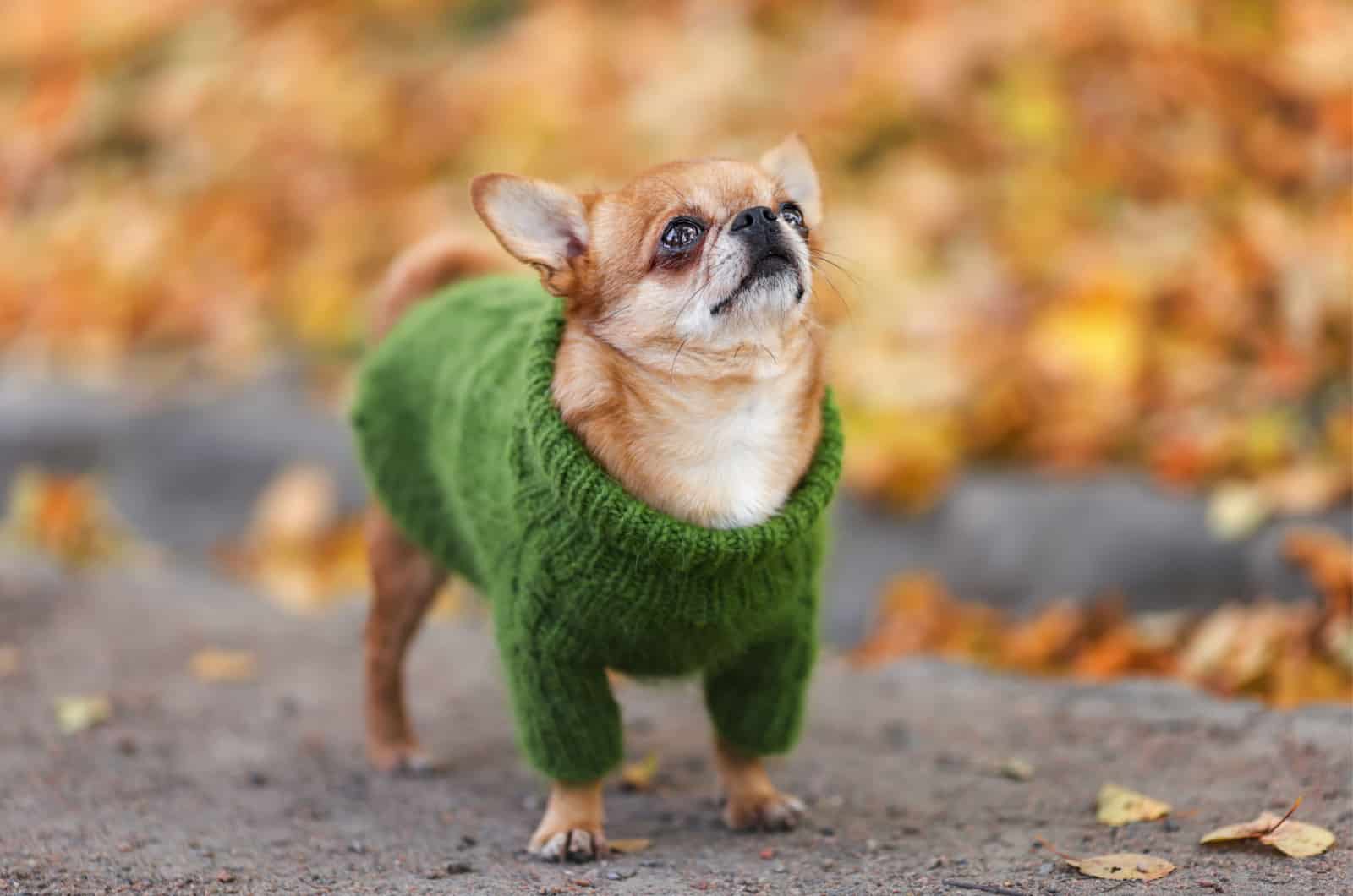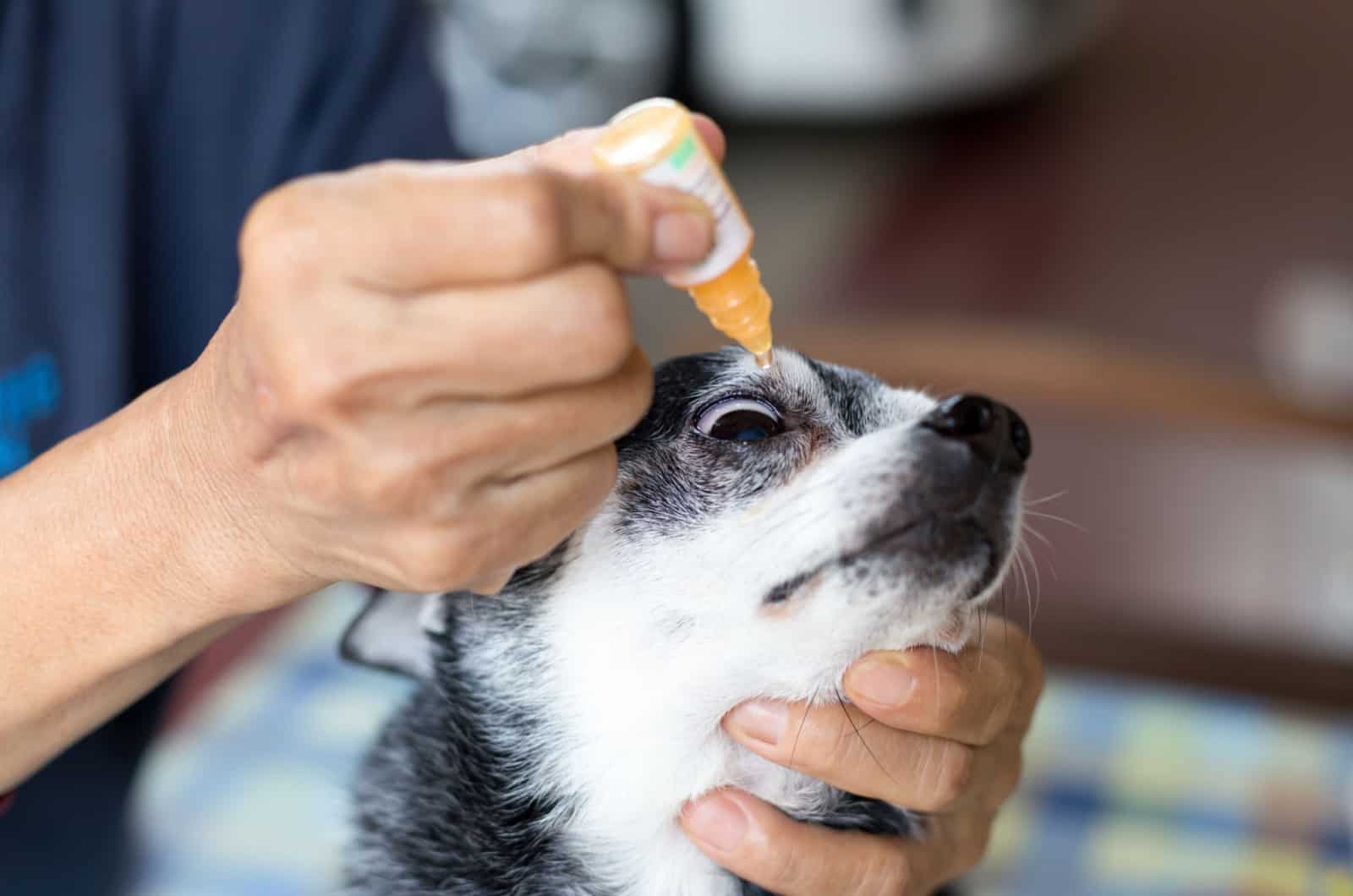You have decided to add a furry friend to your household. Your choice is a charming Chihuahua. Great decision! Chihuahuas are one of the smallest dogs in the world; they are very loyal, affectionate, and adore their owners.
Chihuahuas originate from Mexico, and they can be short-haired or long-haired. They have a pronounced prey drive, but today they are best known as excellent companions for humans.
You are probably familiar with the basic facts about this dog breed, but one thing really surprised you: Your new puppy is crying, and you have no idea how to deal with a crying Chihuahua!
Why is this happening? Why would a Chihuahua cry? Did something bad happen to them?
You are probably worried your dog is upset about something or concerned they may be in pain.
To help, we listed some common reasons why your Chihuahua might be crying. Also, we will provide you with some advice on how you can help your crying Chihuahua.
16 Reasons For A Crying Chihuahua

It is very likely that every dog owner will have to deal with their pet crying at some point. This doesn’t always have to be alarming, and most important of all, you don’t need to panic right away.
But it would be good to know what reasons could cause your Chihuahua to cry. When you determine the exact cause of the problem, it will be easier to help your pet.
Let’s look at the most common reasons why your Chihuahua cries.
1. New Surroundings
You recently brought your Chihuahua home from the kennel. You and the rest of your family members were hoping for endless cuddling and playing, but instead you got a crying Chihuahua.
If you have adopted a puppy that is only about eight weeks old, this is the first time that the puppy has been separated from their mother. Before this, the dog was used to having their mother and other puppies from the same litter around them.
Your Chihuahua has now arrived at a new home and is suddenly introduced to several unknown people. Although you all have good intentions, it is a good idea to let the puppy go through the adaptation period.
When nervous or scared, some Chihuahuas can be aggressive, while others will cry.
2. Attention Seeking
We all love Chihuahuas because they are truly an interesting and charming dog breed. But we have to admit that these dogs can be very possessive. Therefore, one of the reasons why your Chi might cry is a lack of attention from you.
In this way, your small dog wants you to give them your time and always put them first. These dogs do not like to be ignored.
They adore their owners and want to be treated the same way. Seeking attention is a fairly benign cause of crying in Chihuahuas, but care must be taken so that crying does not develop into a more undesirable, persistent behavior.
3. Separation Anxiety
Many dogs can develop separation anxiety, and this is especially common in Chihuahuas. Chihuahuas do not like to be separated from their owners.
Most often, this dog develops a special bond with one person and remains loyal to that person forever. If you wonder why your Chihuahua even follows you to the bathroom, this could be your answer!
One of the reasons your Chihuahua is crying could be separation anxiety. Even if you’ve only left the house for a short time, your Chihuahua puppy may greet you by whimpering and trembling.
This is something that is not easy for any dog owner, but the fact is that none of us can be with our dogs 24 hours a day. Every dog will have to be alone for some time eventually.
Just take care that you don’t leave your puppy home alone for too long, especially in the beginning when they are totally dependent on you.
4. Hunger

If you have noticed that your Chihuahua is crying, it is possible that they are hungry. Chihuahuas are small dogs that need the right dog food to grow into healthy and happy adults.
To begin with, it is important to establish an appropriate feeding schedule that your puppy will get used to from an early age. Once you have established a certain schedule, try to feed your Chihuahua at the same time every day.
You can orient the feeding time for your Chi according to your breakfast, lunch, and dinner. Regarding the diet of the Chihuahua and the desired amount of food for this dog, you can find a lot of useful information in our Chihuahua feeding chart.
Keep in mind that young puppies need to eat more often, so make sure someone is always there to feed your puppy and try not to be away from home for more than a few hours.
5. Teething
Teething is one of the reasons why your Chihuahua may cry.
When they are born, dogs have no teeth. Baby teeth appear in dogs around the third week of age. These teeth are small and pointed.
An adult dog has 42 permanent teeth. Between four to six months of age, the dog’s baby teeth fall out, and after that, the permanent teeth grow. Teething takes about three months.
Besides crying, a teething dog can be restless and probably won’t let you touch their jaw. Most dogs will chew on hard objects, but they may also chew on your furniture. Some dogs even vomit or get diarrhea.
During this period, it is a good idea to give your Chihuahua soft food and buy them chewing toys made of soft rubber that has lots of slits to help the dog massage the gums. In this way, the dog will ease their pain.
6. Food Allergies
Food allergies can cause a Chihuahua to cry. Various proteins in dog food can cause an allergic reaction. Dogs are most often allergic to eggs, chicken, milk, and beef. In some dogs, an allergic reaction occurs shortly after consuming food, while in some, it occurs only a few days later.
In addition to tears, you will likely notice itching, vomiting, and abdominal pain in your dog. Also, it is possible that you will see changes in the dog’s feces. Read more in our dog poop color chart.
If the veterinarian determines the presence of a specific food allergy, they will recommend an elimination diet where the dog will be fed only one source of protein for eight weeks.
It is best if the dog owner cooks the food themself. When the allergy symptoms subside, the dog is given the food they ate before the diet was introduced. If the allergy symptoms return, this confirms that the dog is truly allergic.
Then it is important to determine the exact allergen so that the dog can eat normally while avoiding that specific allergen.
7. Dirt

In some cases, your dog’s tears are caused by the presence of dirt in their eyes. A dog’s eyes are quite sensitive, and dirt easily gets into them.
Maybe your Chihuahua was carefree, playing and rolling around on the floor, and dirt got into their eyes. If this is the case, the crying should not last long.
The dog’s eyes will clear naturally and your Chihuahua will no longer cry!
8. Potty Time
A crying Chihuahua could be trying to tell you it’s time for a potty break. We cannot say with complete certainty why the dog cries in this case, but this is a potential way for your dog to tell you that it is their time to defecate.
This is especially possible if you recently started potty training your Chihuahua. This training is not easy at all; in fact, it can be very challenging for all dog lovers.
The fact is that Chihuahuas are quite stubborn dogs and may not adopt potty training that quickly. However, Chihuahuas like to see their owners happy, so potty training can be successful if you use adequate training methods.
Be patient with your Chihuahua; encourage and praise them. It is best to start potty training a Chihuahua when the puppy is about six months old. Training will probably take up to several weeks.
9. Crate Time
If your Chihuahua is crying at night in their crate, they are probably feeling lonely and insecure in it.
The crate should represent a safe place for every dog and be a favorite place where the dog will go to rest and be alone if it wants to. Crate training is particularly delicate for dogs, and you should give it proper attention. You should not rush your dog with crate training.
Some dogs will quickly be ready to stay alone in their crate while some will need significantly longer time. Test how your Chihuahua reacts to the crate and accordingly determine how long you can leave the dog alone in the crate.
When you are just starting this training, you should only leave your dog alone for a short time. First introduce them to the crate and let them smell it. Try to make the crate as comfortable as possible for your small dog. Put a blanket and a pillow in it, as well as your dog’s favorite toy.
As the dog gets used to and accepts the crate, increase the time they spend in it. If, at the very beginning, you force the dog to spend a long time alone in the crate against their will, you can make the dog hate the crate completely, and this training will be unsuccessful.
10. Lack Of Activity

Chihuahua dogs are very energetic. Chihuahuas are by no means a lazy dog breed for which only a short walk will suffice. If these dogs are bored and do not get enough exercise, they may start to exhibit undesirable behaviors, such as crying, whining, and loud barking.
If your Chihuahua is crying, it may simply be a lack of activity. Consider how often you actually exercise your Chihuahua and whether you are giving them enough mental stimulation.
Even if you think your Chihuahua is getting enough exercise, consider introducing them to some new activities. These dogs quickly get bored with the same toys and the same methods of exercise.
11. Behavior Pattern
In some cases, crying can be a learned behavior pattern. You must be asking yourself: How could that be possible? I didn’t teach my Chihuahua to cry, did I?!
We know that you have not taught your puppy to cry, but consider the following situation: You noticed that your Chihuahua was crying and you came to comfort them.
You probably picked them up, comforted them, and left them in your arms for a while to calm down. In this way, your puppy has learned that every time they cry, you will give them attention. Maybe your dog misses you and wants you to be with them all the time.
Ultimately, crying is a learned behavior pattern in your Chihuahua and your dog now uses crying to get what they want.
12. Sickness

Unfortunately, your Chihuahua might be crying due to some health issue. Dogs can’t tell you they’re in pain, but they can show you with their body language.
If your Chihuahua is crying, check if there are any other additional symptoms, such as loss of appetite, lethargy, vomiting, diarrhea, etc.
If you can’t figure out what exactly it is, it’s time to visit the vet. No pet owner likes to see their dog crying, especially if the reason for this is pain. Therefore, a visit to the veterinarian is in order so you can determine how to best help your dog.
13. Injuries
A playful and energetic dog like a Chihuahua loves to play. These dogs are often not even aware of their size and can behave like some much larger dogs, which is known as small dog syndrome.
Therefore, Chihuahuas are prone to injuries while playing or jumping. A crying chihuahua may have injured themself while playing. It is a good idea to check if there are visible wounds anywhere on the dog’s body.
Your Chihuahua may be nervous and may not allow you to touch them. Try to be as gentle as possible while checking the dog for visible injuries.
14. Fear
Why do Chihuahuas cry?
They might be afraid. Your dog may have been frightened by a loud sound, such as a loud truck on the street or a thunderstorm.
If your dog is suddenly startled by a noise inside the house, it is possible that the sound of a vacuum cleaner or a washing machine frightens them, although you would probably never think of it.
Dogs are very sensitive, and sometimes they hear sounds that we don’t pay attention to at all. In order to prevent this fear in your Chihuahua, it is good to expose them to various sounds in the environment from a young age.
In this way, the dog will get used to different sounds early on, and it will be less likely that these sounds cause them fear.
15. Eye Problems

One of the reasons why your Chihuahua might cry is because of eye problems. Many dogs have sensitive eyes and will encounter health problems related to their eyes at some point in their life.
Let’s review the most common eye problems that can occur in dogs.
Eye Allergies
If your dog has an eye allergy, you will notice it quite easily. The dog’s eyes will probably be very red, and you will notice that the dog is constantly scratching them. Also, a green or yellow discharge may ooze from the dog’s eyes.
In the case of eye allergies, veterinarians usually recommend corticosteroid drops or, alternatively, antihistamines.
So eye allergies are one of the potential reasons for crying Chihuahuas.
Blocked Tear Ducts
Watery eyes in your Chihuahua could mean that the dog has blocked tear ducts. When the dog’s tear ducts are blocked, the tears have nowhere to go, and they remain visible on the dog’s face. In addition to tears, you may also notice red, swollen, or irritated eyes.
A dog’s tear ducts can be blocked due to various causes, such as an eye injury, eye infection, or a more serious condition such as a tumor.
When you notice the symptoms of blocked tear ducts in your Chihuahua, you can try to clean the area around the eyes yourself. If you do not see any improvement, seek the help of a veterinarian.
Cataracts
Cataracts is a disorder in the dog’s eye, and it refers to clouding of the lens of the eye. Cataracts can occur as a result of trauma in the dog’s eye, it can be congenital, or it can be symptomatic. You will notice cataracts in a dog by the change in eye color.
The dog’s eyes will become cloudy, and you may notice that your dog is less concentrated and that he bumps into people or objects while walking. Cataracts occur most often in adult dogs and older dogs. Severe forms of cataract can also lead to blindness.
In order to determine the presence of cataracts, a veterinarian measures the eye pressure and examines the eye lens of the dog. In some cases, veterinarians recommend surgical treatment of cataracts.
Cherry Eye
Cherry eye is a canine eye condition related to prolapse of the lacrimal gland. This condition occurs as a result of the rupture of ligaments and twisting of the lacrimal gland.
When the position of the dog’s lacrimal gland changes, it is possible for the dog to have long-term inflammation that impairs the dog’s quality of life.
Dogs with cherry eyes may experience pain and feel uncomfortable. If the veterinarian deems it necessary, they can recommend surgery to return the dog’s lacrimal gland to its natural position.
Conjunctivitis
One of the most common eye problems dogs can have is conjunctivitis. This medical condition is an inflammation of the front membrane of the eye. This membrane is important for dogs because it prevents dirt and bacteria from entering their eyes.
Conjunctivitis can occur in one or both eyes, and it can be acute or chronic. Acute conjunctivitis occurs due to specific allergies or infections, while chronic conjunctivitis recurs.
Chihuahuas are one of the dog breeds that are more susceptible to conjunctivitis. Besides watery eyes, additional symptoms of conjunctivitis are red eyes, uncontrollable blinking, and a sunken eyeball. You may also notice that the dog often rubs their eyes with their paws.
The dog’s eye may be completely closed. In some severe cases, conjunctivitis can cause permanent damage to the cornea, so it is necessary to ask for medical advice if you notice symptoms of conjunctivitis in your Chihuahua.
These dogs are known to have a pretty long lifespan, but all dog owners need to take proper care of their Chis to make sure they spend a long time together.
Glaucoma
Glaucoma generally refers to elevated eye pressure in dogs. It is known as one of the most common causes of vision loss in dogs. High eye pressure causes the eyeball to enlarge, and the cornea of the eye becomes thicker and cloudy.
Glaucoma in dogs can be congenital, primary, and secondary. Congenital glaucoma is inherited genetically and can be noticed in puppies just a few weeks after birth.
Primary glaucoma occurs most often in the following breeds:
• Beagles
• Cocker Spaniels
• Siberian Huskies
• Boston Terriers
• Miniature Poodles
Secondary glaucoma occurs due to an inability to drain the aqueous humor. Various diseases, such as diabetes, melanoma, or eye trauma, can lead to secondary glaucoma.
If the veterinarian determines that your dog has glaucoma in one eye, they will immediately check the other eye and prescribe the appropriate therapy for the healthy eye as well.
16. Canine Cognitive Dysfunction Syndrome
If your Chihuahua is older, one of the possible reasons why they would cry is a disease called cognitive dysfunction syndrome. You may have noticed other symptoms in your pooch, such as poorer hearing and vision, lack of mobility, and weight loss.
Also, your Chihuahua now probably wants to sleep as much as possible and may seem confused or disoriented. Along with crying and whining, the dog may also bark more often.
Cognitive dysfunction in dogs is a disease similar to Alzheimer’s disease in humans. A dog with this disease behaves disoriented, forgets some basic things, and in some cases does not recognize their owners.
If your Chihuahua is suffering from cognitive dysfunction, they may seem lost and not have the same interest in socializing or cuddling with you as before. You may also notice defecating around the house even though your dog was perfectly potty trained before.
A dog with this disease may show greater anxiety and develop various fears. This situation is quite difficult for our furry friends, and every owner should show additional understanding and support for their dog.
When your dog is at an advanced age, it is important to keep them active, both physically and mentally. If the vet confirms that your dog has cognitive dysfunction, you should do everything to make them feel even more loved and safe.
How To Help A Crying Chihuahua

Nobody wants to see their dog crying. Even if you believe that dogs cannot show emotions in the same way as us, you are still sure that a dog should not cry. You are used to your dog welcoming you excitedly, wagging their tail, and inviting you to play.
Every problem has a solution, and this is also the case with a crying Chihuahua.
See what you can do to help a Chihuahua in tears.
Determine The Cause
The first step of solving any problem is determining the exact cause. As we have seen, there are various causes of a crying Chihuahua.
First, carefully research which of the described causes could be the one causing your Chihuahua to cry. After that, you can make a decision about whether you will try to solve the problem yourself or if professional help will be needed.
Of course, treating a crying Chihuahua will not be the same if the reason is, for example, separation anxiety, as it would be with a more serious problem like a disease of the eyes.
Don’t Reward Crying
When behavior is rewarded, it makes sense that everyone would repeat it. Likewise, crying in dogs can represent a learned pattern of behavior that dog owners, often unconsciously, encourage.
If everything is fine with your Chihuahua, maybe they arereally crying to get attention. In this case, crying should not be rewarded.
In this case, you should not comfort your dog and pet them. We know it’s hard to listen to a dog cry at night, but in the long run, you’ll be making it harder for yourself if your Chihuahua gets used to crying to get what they want.
Make Your Dog Feel Loved And Safe
Anxiety and fear are some of the possible reasons why your Chihuahua might cry. Any dog can develop anxiety at any time in their life.
The sooner you determine the exact cause of why your dog is upset or scared, the sooner you can start working on a solution to the problem.
Every dog should feel a sense of security and care in their home. A dog that is treated well is more confident and generally healthier and happier.
Such dogs are less likely to feel insecure and anxious. Therefore, do everything possible to make your home a safe haven for your Chihuahua.
Provide Enough Exercise
A dog that does not get enough exercise becomes frustrated and may cry. An energetic dog like the Chihuahua requires daily exercise, both physically and mentally.
You’ve probably been thinking that since they are so fragile, your Chi shouldn’t be over-exercised to avoid injury. This is also true, but you should always provide them with walks and play sessions.
Also, you can assign them various tasks to keep them mentally stimulated. For example, you can try to hide their favorite toy and watch them try to find it. It is important to make sure that not a single day goes by without the dog being given at least a minimal level of exercise.
See A Vet
If you have noticed any additional symptoms besides crying in your Chihuahua and you believe that the cause is of a medical nature, it is definitely time to visit the veterinarian.
They will perform a detailed examination and dispel all doubts related to your dog’s health.
If the veterinarian determines that everything is medically fine with your Chihuahua, they might explain to you that there is a problem with your dog’s behavior.
In this case, they can explain to you how to try to correct the unwanted behavior in the dog, or they will advise you to seek the help of a dog trainer.
Bottom Line
As we have seen, there are many things that can cause a crying Chihuahua.
Crying in humans is usually associated with sadness or fear. We cannot say that dogs cry for the same reasons as us. However, tears sometimes really mean that your Chihuahua is overwhelmed or suffering from separation anxiety.
In other cases, crying may just be a way for your Chihuahua to get your attention. What we always hope is that crying is not an indicator of a more serious health condition in our dogs.
You may be able to determine the exact cause of your Chihuahua’s tears yourself. Monitor changes in your dog’s behavior and their reactions to events in the environment. If you cannot find out why your dog is crying, it is the right time to contact the veterinarian.
Read Next:
• Applehead Teacup Chihuahua: All You Need To Know
• Chihuahua Growth Chart Decoded: How Big Can A Chihuahua Get?
• What Were Chihuahuas Bred For? Origins of These Little Dogs
